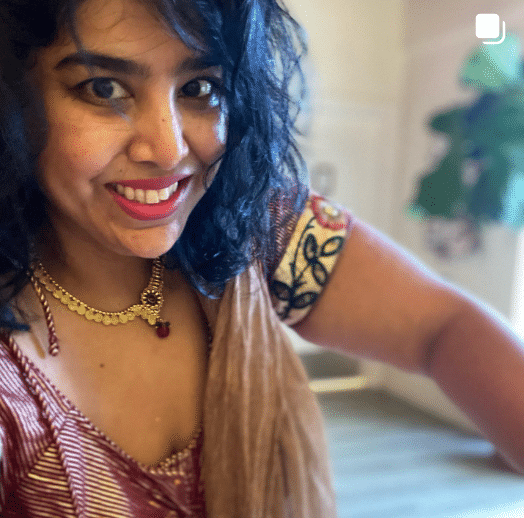You Say Goodbye and I Say Hello: On the Use of Namaste

By Maryam Bakht
At the Bella Prāṇa Collective we have been reflecting the use of the word Namaste at the end of classes, and as a result many teachers may be choosing to change the way they honor the end of a yoga class going forward. As an Indian yoga instructor, and trained linguist, Bella Prāṇa asked me to write this blog to give our community resources and greater context for why we are having this conversation.
Ask an American yogi what words they know from Sanskrit and it’s likely that the responses won’t be the names of specific āsana, but rather the word ‘namaste’. The use of the word ‘namaste’ at the end of yoga classes has been discussed in the literature for the last few years by yogis and anthropologists alike.
The word namaste is found in Old Sanskrit, which is found in the Vedas (the ancient texts that build the basis of modern Hinduism). The Sanskrit verb “namaha” originally meant “to bend” and the affix “-te” means ‘to you’, roughly translating “I bow to you” which has the level of submission and formality when one is showing someone respect. Over time, this meaning has gone to mean “salutations” or “greetings”. The common use of the term is as a rather formal way of saying “hello”.
In many American yoga classes, it is common to END a class with the word “namaste”. I conducted a very unofficial survey of ten people (chosen because they are not Desi or claim any Indian ethnic ties and they also are novices or non-practitioners of yoga) and eight of the respondents reported that they thought the meaning of namaste was to end a yoga class. Incidentally, this is one of the only linguistic situations where ‘namaste’ is used in such a way. Very American Yogi. How did this happen? That’s unclear although it is something that has only established itself as a linguistic practice in the last few decades. There are some beautiful interpretations of what namaste is loosely translated as “The Divine light in me bows to the Divine light in you” which likely helped to solidify this use.
My own specific issue on the use of ‘namaste’ to close yoga classes does not derive from my ethnic heritage as a Desi, although I do strongly assert and have cultural practices that align with someone with heritage from the Indian Subcontinent. Rather, the primary reason I can’t quite bring myself to say it is that I’m a trained professional sociolinguist and I can’t quite get over it as a simple academic question.
From a linguistic perspective, the use of ‘namaste’ is simply incorrect. Namaste is currently used by millions of speakers in common speech. For those speakers, the use of namaste is a greeting and never a closing. As a linguist, I choose to respect the uses of non-English words to their native speakers. The simple truth of the matter is that people who use the word ‘namaste’ regularly in their linguistic repertoire use it differently. If we are truly honoring the history of a word in a language, surely that must start with respect for those speakers who still use the word.
From an anthropological perspective, the use of ‘namaste’ opens a discussion of cultural appropriation in yoga. Here is this word, that at this point in time, isn’t all that holy being made into a very holy and sacred word by yoga practitioners of the West. Not all Hindus or Desis or Indians are offended by this use—that might be going a bit too far. However, at least some people feel a bit culturally icky about it. For me personally, that is enough of a reason to try to limit the use of any word.
I’ve heard some comments recently worrying about yoga students feeling robbed of their end of class namaste. I admit that as an old lady academic type, I feel no sympathy for this. Students should take whatever good they can from whatever class is being taught. Sometimes you don’t understand the class. Sometimes you feel overwhelmed by a class. But every single time, there is something to learn about yourself, about your mind, about your yoga. I simply do not believe that people are incapable of growth. In fact, my entire career has hinged on the very strong belief that people are always able to learn throughout the lifespan and to change for the better if that is what they wish to do.
Words have meaning and can give people feelings. A well-placed word or phrase can make all the difference in the world to someone’s day. But as important as it is to make people feel good about themselves and what they are experiencing, it’s also important to use words accurately so that they do not mislead and do not inadvertently offend. My stance as a yoga teacher is deeply entrenched in my practice as a yoga student. Students are meant to learn new things all the time and hopefully can use that knowledge to flex their own actions to make a better world around us. It seems very basic advice to say “only use words that you know how to use”, but for me, that means much more than that. Please think about the words that you hear and that you use and think about them and the speakers who speak them.
Personally, I have never used the word ‘namaste’ at the end of any yoga class. I don’t think that people have suffered for it. I probably give more ‘dharma talk’ chatter than most 26&2 yoga style teachers, but I think that it is important to express gratitude and understanding of what the class has just completed and to stress the importance of rest and reconciliation in savasana at the end of practice. I end my classes in a way that is powerful and authentic to my own style of teaching and I love when I practice with teachers who have their own thoughtful and powerful way of ending theirs.
The Bella Prāṇa Wellness Collective is a yoga and meditation studio located in Tampa, Florida.
